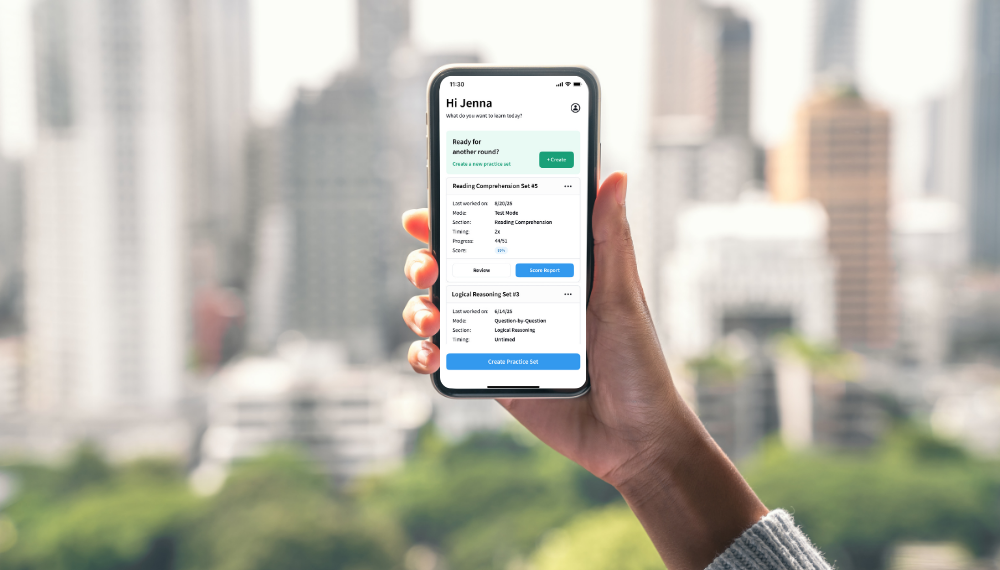
You have officially completed the LSAT and hope you got a good LSAT score. You prepared with LSAT courses and LSAT practice exams. LSAT scores have officially been released, which means that at least some people are now faced with a difficult decision: To retake the LSAT or not to retake? Furthermore, how many times can you take the LSAT? There are two big truths that you need to take into consideration when deciding whether to give the LSAT another try.
How much is it to take the LSAT?
Before we dive into retake specifics, you need to remember some basic logistics. The LSAT registration fee is $200. There’s no discount for retaking the LSAT, though you can take solace in the fact that you may skip the LSAT Writing section if you’ve already completed it. You will have to keep an eye on registration deadlines and make sure it’s still open for the LSAT you want to take.
Ok, now that we have that out of the way, let’s talk about retaking the LSAT.
Truth #1: It will almost definitely help your law school application
If you think you can do better on the LSAT, then it will almost certainly be worth your while to retake, even if it means more LSAT prep. Even if you won’t be able to submit your applications until later in the cycle than you’d originally planned, given the choice between submitting earlier with a lower score or later with a higher score, the latter option will pretty much always result in more success.
Truth #2: Most people don’t actually score much higher when they retake
LSAC has actually released data on what happened to people who took the LSAT more than once, and it’s pretty interesting stuff. The data shows that, although most people did increase their scores, on average their scores were only higher by a couple points. For instance, of the 531 people who originally got a 160 on the LSAT, 359 managed to score better on the second time around, while 42 got the same score and 130 actually did worse. (Yikes!) The average LSAT score for people who took it a second time and originally scored a 160 was 162. You see the same trend all over this chart — test takers at pretty much all levels snagged one to two extra points, but not much more than that.
Now, there’s no question that scoring even a couple extra points on the LSAT can boost your application (see truth #1). But there are a couple lessons we can learn from this information (if we leave the realm of verifiable data and enter the world of measured speculation).
I surmise that one reason test scores change so little on average is that many retakers underestimate the amount of time they’ll be able to spend studying for their second take. If you decide to retake but then don’t have much time to actually prepare, your score isn’t going to change by much. On the other hand, if you’re able to continue devoting a lot of time to your studies, by taking LSAT practice tests, reviewing a writing sample, or attending LSAT prep classes, it’s more probable that you’ll “beat the odds.” So if you’re going to do this thing, you should be prepared to go all in on your studying.
At the same time, statistics are statistics for a reason. So if you’re choosing whether to give the LSAT a second (or even third) try, you should consider the very real possibility that your score will only improve marginally (if at all). Only you can decide whether it would be worth dedicating the extra LSAT preparation time, money, and effort for that kind of change. Again, that’s not to say that your score definitely will follow the average trend; you just need to be cognizant that it’s a possibility.
You might think I’m trying to talk you out of retaking the LSAT, but in fact, it’s quite the opposite — if someone is unhappy with his or her score, in most cases, I’d advise that it makes sense to take the test another time. But the best decision is a fully informed one, so make sure you’ve asked yourself all these questions and considered all possible outcomes before you take that step.
So, before you make that decision to retake, take a moment to reflect and ask yourself if it’s worth it and if you really need to. Still leaning towards a retake? Here’s how to do it right:
1. Review Correctly
In the days before the LSAT, you were probably doing lots of practice tests and timed practice. Now, it’s time to slow down. Review everything. Take advantage of in-depth analytics in your LSAT prep to discover what your weaker areas are. Find out what you need to work on before you dive back into your prep.
Reviewing questions you’ve done is always important, but it’s especially important for you now. Every time you miss a question or get one right by lucky guess, try to pick that question apart until you feel like you could explain it to someone else. Don’t worry about your speed just yet; it’s time to really focus on your mastery of the LSAT’s underlying logic.
2. Practice as Realistically as Possible
If you never took your tests in realistic testing environments, the real thing probably seemed like a hellish nightmare. When prepping for a retake, try to replicate the real testing environment as much as you can when taking LSAT practice tests. Get someone to proctor for you. Make sure you’re taking the test with the right number of sections (three scored sections and one experimental for the remote LSAT). Build up your stamina and mental endurance.
3. Switch LSAT Prep Methods
It’s important to find the right prep for your unique learning style. When evaluating how you can improve in an LSAT retake, consider taking a different type of LSAT prep. If you took an LSAT class, maybe try private LSAT tutoring or a self-paced online LSAT course. Sometimes changing one thing can make a big difference in your overall score.
4. Find the Time
The most critical thing you need during your LSAT prep is time. The best prep materials in the world mean nothing if you don’t have adequate time to prepare. Make more time than you did last time. Make more time than you think necessary. Aim for at least a month of timed LSAT sections and full LSAT practice tests. But that should come after your thorough review of everything. Get started now.
Finally, stay positive. Whether you were happy with your practice test LSAT scores but got tripped up on the real thing, or you never quite got to where you wanted to be, it’s ok. You’ll have to put in some serious work, but think of where you’d like to be in a few years and use that as motivation.
Our advice to someone thinking about taking the LSAT a third or fourth or seventh time is the same as my advice to someone thinking about taking the LSAT a second time. Do it, if that’s what’s needed to get into a law school you’d want to go to. Without an LSAT score that’s within the school’s 25-75 median LSAT score range, you’re probably not getting in. With that score — even if it took you several attempts to get it — you at least have a shot.
In all, don’t look at having to take the LSAT more than once as some enormous failure in your application. Every applicant has their own story to tell — and if your story involves taking the LSAT more than once, that is totally OK. Law schools don’t look down on multiple LSAT scores.




